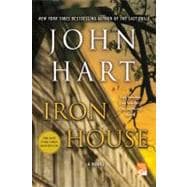
Note: Supplemental materials are not guaranteed with Rental or Used book purchases.
Purchase Benefits
What is included with this book?
John Hart is the author of four New York Times bestsellers, including The King of Lies, Down River and The Last Child. The only author in history to win the best novel Edgar Award for consecutive novels, John has also won the Barry Award and England's Steel Dagger Award for best thriller of the year. His books have been translated into twenty-nine languages and can be found in over fifty countries. A former criminal defense attorney, John has also worked as a banker, stockbroker, and apprentice helicopter mechanic. A husband and father of two, he spends his time in North Carolina and Virginia.
"It isn’t as if Hart’s career needed jump-starting. His first three stand-alone thrillers have been greeted by an ever-growing crescendo of praise, including two Edgar Awards. Definitely not the kind of writer who needs a breakthrough book. And, yet, Iron House lifts Hart to an altogether new level of excellence…. The present-time plot—disaffected Mob hit man on the run, trying to carve a new life without endangering those he loves—makes a superb thriller on its own (steadily building tension, magnificently choreographed fight scenes, including a High Noon–like finale), but it’s what Hart does with the backstory that gives the novel its beyond-genre depth. Like the great Peter Hoeg in Borderliners (1994), Hart uses the familiar story of mistreatment in an orphanage as a way into the inner lives of his characters, and the blind fear, abject confusion, and yearning for love he finds there are both heartbreaking and curiously hopeful, in an almost postapocalyptic way. An unforgettable novel from a master of popular fiction.” –Booklist, starred review
"This rich, impressive contemporary thriller from two-time Edgar-winner Hart (The Last Child) focuses on two brothers, Michael and Julian, both raised and abused at the Iron House of the title, an orphanage in the mountains of North Carolina.... Hart deftly interweaves a complex family history story with Stevan's intense, bloody quest for vengeance.... [The book's] powerful themes and its beautiful prose will delight Hart's fans--and should earn him many new ones." --Publishers Weekly, starred review
Overwhelming Praise for the National Bestselling Work of John Hart:
The New copy of this book will include any supplemental materials advertised. Please check the title of the book to determine if it should include any access cards, study guides, lab manuals, CDs, etc.
The Used, Rental and eBook copies of this book are not guaranteed to include any supplemental materials. Typically, only the book itself is included. This is true even if the title states it includes any access cards, study guides, lab manuals, CDs, etc.